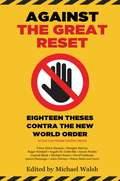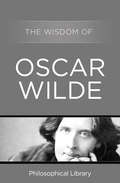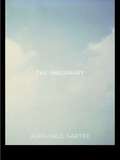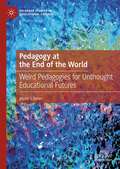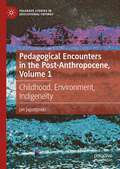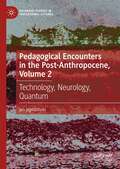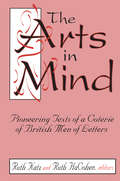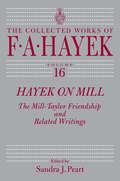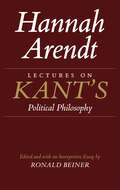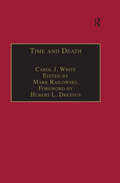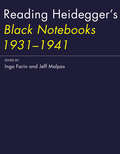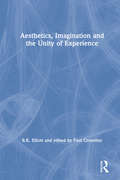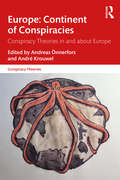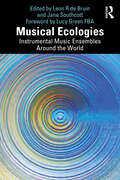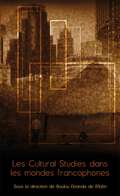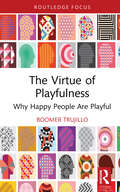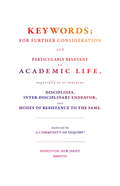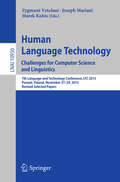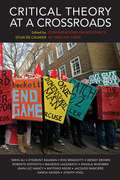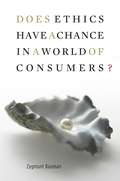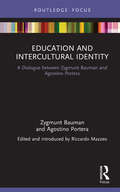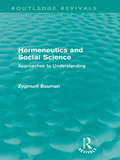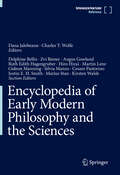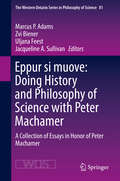- Table View
- List View
Against the Great Reset: Eighteen Theses Contra the New World Order
by the-Pipeline.orgMuch more than a collection of essays by eminent writers, Against the Great Reset is intended to kick off the intellectual resistance to the sweeping restructuring of the western world by globalist elites.In June 2020, prominent business and political leaders gathered for the 50th annual meeting of the World Economic Forum in Davos, Switzerland, under the rubric of &“The Great Reset.&” In the words of WEF founder Klaus Schwab, the Great Reset is a &“unique window of opportunity&” afforded by the worldwide COVID-19 panic to build &“a new social contract&” ushering in a utopian era of economic, social, and environmental justice. But beneath their lofty and inspiring words, what are their actual plans? In this timely and necessary book, Michael Walsh has gathered trenchant critical perspectives on the Great Reset from eighteen eminent writers and journalists from around the world. Victor Davis Hanson places the WEF&’s prescriptions and goals in historical context and shows how American politicians justify destructive policies. Michael Anton explains the socialist history of woke capitalism. James Poulos looks at how Big Tech acts as informal government censors. John Tierney lays out the lack of accountability for the unjustified panic over the virus. David Goldman confronts the WEF&’s ideas for a fourth industrial revolution with China&’s commitment to being the leader of a post-western world. And there are many more. These writers see the goal of the Great Reset as not just a world without racism, disease, economic inequality, or fossil fuels—but rather, a world with no individual autonomy and power in which our betters rig the system for their own purposes. Find out what the Great Resetters ultimately have in store for you, and join the intellectual resistance—before it&’s too late. Featuring Essays by: Michael Anton Salvatore Babones Conrad Black Jeremy Black Angelo Codevilla Janice Fiamengo Richard Fernandez David P. Goldman Victor Davis Hanson Martin Hutchinson Roger Kimball Alberto Mingardi Douglas Murray James Poulos Harry Stein John Tierney Michael Walsh
The Wisdom of Oscar Wilde (Wisdom)
by the Wisdom ofA comprehensive selection of his quips, aphorisms, and witOne of the most well known personalities of his day, Oscar Wilde charmed and beguiled readers and audiences with his eloquent and biting observations, his smart quips, and the witticisms peppering his own speech and the speech of his characters. The Wisdom of Oscar Wilde collects both his best-loved quotes and longer excerpts, revealing a man wise to human nature and his times, and never shy with his searing comments on men, women, art, behavior, children, politics, youth, and a range of other topics. Drawing from his plays, articles, reviews, speeches, letters, and other works, this definitive volume is an entertaining immersion into the world of this charming genius.
The Imaginary: A Phenomenological Psychology of the Imagination (Routledge Classics Ser.)
by Jean-Paul Sartre revised by Elkaim-SartreFirst published in 2004. Routledge is an imprint of Taylor & Francis, an informa company.
Pedagogy at the End of the World: Weird Pedagogies for Unthought Educational Futures (Palgrave Studies in Educational Futures)
by jessie l. beierThis book interrogates the ways in which “end of the world” thinking has come to define and delimit pedagogical approaches in Anthropocene times. Chapters unfold through a series of speculative studies of educational futurity—sustainable futures, energy futures, working futures—each of which is positioned as an experimental site for probing the limits of pedagogical unthinkability so as to speculate, through concept creation, on unthought educational trajectories. Specifically, the book is oriented towards the creation of pedagogical concepts that work to problematize and resituate questions of educational futurity in relation to the planetary realities raised by today’s pressing extinction events. It is from this experimentation that a weird pedagogy emerges, that is, an experimental pedagogical anti-model, a speculative program for the unprogrammable that seeks to counter-actualize potentials of and for unthinking pedagogy at the (so-called) end of the world.
Pedagogical Encounters in the Post-Anthropocene, Volume 1: Childhood, Environment, Indigeneity (Palgrave Studies in Educational Futures)
by jan jagodzinskiThis volume, the first of a two volume set, addresses three major areas in response to the post-Anthropocene: childhood, environment and indigeneity. Each of these areas is broadly addressed in relation to the concerns that have arisen both theoretically and educationally. The author terms these to be encounters as each area presents a particular problematic when addressing the phase change that the planet is undergoing where the anthropogenic labour of global humanity is contributing to climate change, endangering our very existence. There has been a concerted effort to overcome the nature-culture divide in education. The author reviews this development in the first section where there has been a particular emphasis placed on childhood education. In the second section he turns to the pedagogical theories that are attempting to overcome this same divide in environmental and science education. The last section attempts to bring into the conversation the vast literature on Indigeneity and their attempts to revise traditional education to meet these extraordinary times.
Pedagogical Encounters in the Post-Anthropocene, Volume 2: Technology, Neurology, Quantum (Palgrave Studies in Educational Futures)
by jan jagodzinskiAs a follow up to Pedagogical Encounters in the Post-Anthropocene, Volume I, this book addresses three major areas in response to the post-Anthropocene: Technology, Neurology, Quantum. Each of these areas is broadly addressed in relation to the concerns that have arisen both theoretically and educationally. As in Volume I, the author terms these to be encounters as each area presents a particular problematic when addressing the phase change that the planet is undergoing where the anthropogenic labour of global humanity is contributing to climate change, endangering our very existence. Technology in education has been a significant development. There is a concerted effort to review this development placing stress on the rise of learning machines and algorithms. In the second encounter the vast literature on neurology is addressed, especially neurodiversity and the various symptoms that have emerged in the post-Anthropocene era. The last section reviews issues related to quantum theory as this is fundamental to tensions between physics and metaphysics. The volume concludes with the author’s own pedagogical proposal for the future.
The Arts in Mind: Pioneering Texts of a Coterie of British Men of Letters
by Ruth Katz editors Ruth HaCohenAmajor shift in critical attitudes toward the arts took place in the eighteenth century. The fine arts were now looked upon as a group, divorced from the sciences and governed by their own rules. The century abounded with treatises that sought to establish the overriding principles that differentiate art from other walks of life as well as the principles that differentiate them from each other. This burst of scholarly activity resulted in the incorporation of aesthetics among the classic branches of philosophy, heralding the cognitive turn in epistemology. Among the writings that initiated this turn, none were more important than the British contribution. The Arts in Mind brings together an annotated selection of these key texts.A companion volume to the editors' Tuning the Mind, which analyzed this major shift in world view and its historical context, The Arts in Mind is the first representative sampling of what constitutes an important school of British thought. The texts are neither obscure nor forgotten, although most histories of eighteenth-century thought treat them in a partial or incomplete way. Here they are made available complete or through representative extracts together with an editor's introduction to each selection providing essential biographical and intellectual background. The treatises included are representative of the changed climate of opinion which entailed new issues such as those of perception, symbolic function, and the role of history and culture in shaping the world.>
Hayek on Mill: The Mill-Taylor Friendship and Related Writings (The Collected Works of F. A. Hayek #16)
by Friedrich A. Hayek Sandra J. Peart edited by Sandra J. PeartBest known for reviving the tradition of classical liberalism, F. A. Hayek was also a prominent scholar of the philosopher John Stuart Mill. One of his greatest undertakings was a collection of Mill's extensive correspondence with his longstanding friend and later companion and wife, Harriet Taylor-Mill. Hayek first published the Mill-Taylor correspondence in 1951, and his edition soon became required reading for any study of the nineteenth-century foundations of liberalism. This latest addition to the University of Chicago Press's Collected Works of F. A. Hayek series showcases the fascinating intersections between two of the most prominent thinkers from two successive centuries. Hayek situates Mill within the complex social and intellectual milieu of nineteenth-century Europe-as well as within twentieth-century debates on socialism and planning-and uncovers the influence of Taylor-Mill on Mill's political economy. The volume features the Mill-Taylor correspondence and brings together for the first time Hayek's related writings, which were widely credited with beginning a new era of Mill scholarship.
Lectures on Kant's Political Philosophy
by Hannah Arendt edited by Ronald BeinerHannah Arendt's last philosophical work was an intended three-part project entitled The Life of the Mind. Unfortunately, Arendt lived to complete only the first two parts, Thinking and Willing. Of the third, Judging, only the title page, with epigraphs from Cato and Goethe, was found after her death. As the titles suggest, Arendt conceived of her work as roughly parallel to the three Critiques of Immanuel Kant. In fact, while she began work on The Life of the Mind, Arendt lectured on "Kant's Political Philosophy," using the Critique of Judgment as her main text. The present volume brings Arendt's notes for these lectures together with other of her texts on the topic of judging and provides important clues to the likely direction of Arendt's thinking in this area.
Time and Death: Heidegger's Analysis of Finitude (Intersections: Continental and Analytic Philosophy)
by Carol J. White edited by RalkowskiIn Time and Death Carol White articulates a vision of Martin Heidegger's work which grows out of a new understanding of what he was trying to address in his discussion of death. Acknowledging that the discussion of this issue in Heidegger's major work Being and Time is often far from clear, White presents a new interpretation of Heidegger which short-circuits many of the traditional criticisms. White claims that we are all in a better position to understand Heidegger's insights after fifty years because they have now become a part of the conventional wisdom of common opinion. His view shows up in accounts of knowledge in the physical sciences, in the assumptions of the social sciences, in art and film, even in popular culture in general, but does so in ways ignorant of their origins. Now that these insights have filtered down into the culture at large, we can make Heidegger intelligible in a way that perhaps he himself could not. White presents the best possible case for Heidegger, making him more intelligible to those people with a long acquaintance with his work, those with a long aversion to it and in particular to those just starting to pursue an interest in it. White places the problems with which Heidegger is dealing in the context of issues in contemporary Anglo-American philosophy, in order to better locate him for the more mainstream audience. The language and approach of the book is able to accommodate the novice but also offers much food for thought for the Heidegger scholar.
Reading Heidegger's Black Notebooks 1931-1941
by Jeff Malpas edited by Ingo FarinHeidegger scholars consider the philosopher's recently published notebooks, including the issues of Heidegger's Nazism and anti-Semitism.For more than forty years, the philosopher Martin Heidegger logged ideas and opinions in a series of notebooks, known as the “Black Notebooks” after the black oilcloth booklets into which he first transcribed his thoughts. In 2014, the notebooks from 1931 to 1941 were published, sparking immediate controversy. It has long been acknowledged that Heidegger was an enthusiastic supporter of the Nazi Party in the early 1930s. But the notebooks contain a number of anti-Semitic passages—often referring to the stereotype of “World-Jewry”—written even after Heidegger became disenchanted with the Nazis themselves. Reactions from the scholarly community have ranged from dismissal of the significance of these passages to claims that the anti-Semitism in them contaminates all of Heidegger's work. This volume offers the first collection of responses by Heidegger scholars to the publication of the notebooks. In essays commissioned especially for the book, the contributors offer a wide range of views, addressing not only the issues of anti-Semitism and Nazism but also the broader questions that the notebooks raise.ContributorsBabette Babich, Andrew Bowie, Steven Crowell, Fred Dallmayr, Donatella Di Cesare, Michael Fagenblat, Ingo Farin, Gregory Fried, Jean Grondin, Karsten Harries, Laurence Paul Hemming, Jeff Malpas, Thomas Rohkrämer, Tracy B. Strong, Peter Trawny, Daniela Vallega-Neu, Friedrich-Wilhelm von Herrmann, Nancy A. Weston, Holger Zaborowski
Aesthetics, Imagination and the Unity of Experience
by R.K. Elliott edited by CrowtherThis is the first book to gather together R. K. Elliott's important essays on aesthetics. These essays put forward a number of common themes that together constitute a unified approach to aesthetics. A theory of imagination is developed and ideas concerning the practice of art criticism are explored before the relevance of aesthetics for ethics is discussed. Throughout his writing Elliott combines analytic rigour with sympathy for ideas in continental philosophy. He values subjectivity but his analytic stance prevents this from falling into mere personal opinion; he is also able to show how art and aesthetic theory is of complex relevance to broader areas of experience such as education, freedom, and moral action. In the course of his discussion Elliott offers an in-depth analysis of Kant's Critique of Judgement, Clive Bell's aesthetic theory, and the relevance of Wittgenstein for aesthetics. Study of Elliott's essays presented in this book powerfully illuminates the unifying role of imagination and the aesthetic in human experience.
Europe: Conspiracy Theories in and about Europe (Conspiracy Theories)
by dreas Önnerfors and André KrouwelThis edited volume investigates for the first time the impact of conspiracy theories upon the understanding of Europe as a geopolitical entity as well as an imagined political and cultural space. Focusing on recent developments, the individual chapters explore a range of conspiratorial positions related to Europe. In the current climate of fear and threat, new and old imaginaries of conspiracies such as Islamophobia and anti-Semitism have been mobilised. A dystopian or even apocalyptic image of Europe in terminal decline is evoked in Eastern European and particularly by Russian pro-Kremlin media, while the EU emerges as a screen upon which several narratives of conspiracy are projected trans-nationally, ranging from the Greek debt crisis to migration, Brexit and the COVID-19 pandemic. The methodological perspectives applied in this volume range from qualitative discourse and media analysis to quantitative social-psychological approaches, and there are a number of national and transnational case studies. This book will be of great interest to students and researchers of extremism, conspiracy theories and European politics.
New Approaches to Neo-Kantianism
by Nicolas De Warren Andrea Staiti de Warren, Nicolas and Staiti, AndreaAfter the demise of German Idealism, Neo-Kantianism flourished as the defining philosophical movement of Continental Europe from the 1860s until the Weimar Republic. This collection of new essays by distinguished scholars offers a fresh examination of the many and enduring contributions that Neo-Kantianism has made to a diverse range of philosophical subjects. The essays discuss classical figures and themes, including the Marburg and Southwestern Schools, Cohen, Cassirer, Rickert, and Natorp's psychology. In addition they examine lesser-known topics, including the Neo-Kantian influence on theory of law, Husserlian phenomenology, Simmel's study of Rembrandt, Cassirer's philosophy of science, Cohen's philosophy of religion in relation to Rawls and Habermas, and Rickert's theory of number. This rich exploration of a major philosophical movement will interest scholars and upper-level students of Kant, twentieth-century philosophy, continental philosophy, sociology, and psychology.
Musical Ecologies: Instrumental Music Ensembles Around the World
by Jane Southcott de Bruin, Leon RCommunity music around the world reflects the growing and diverse ways humans collectivise and express themselves in ways that articulate our cultural, social, and environmental complexity. Revisiting, redevising, and reimagining some of the field’s approaches, ideologies, and contexts, this co-edited volume investigates beyond generalist intercultural and internationalist concepts to reveal the complexity of social ways people come together to make music and to making music be central to this sociality.The authors explore the role community music plays out around the world and how various instrumentally based music-making communities operate as ecologies that allow notions of social, political, and cultural agency and identity/ies. Chapters cover various instrumental community music ensembles, observing how they, as social microcosms of change and stasis, provide working methods new and old, extol values, and model ethical behaviours that are fluid and dynamic, steadfast and unyielding, and that contribute to the ebb and flow of people and their agency that remains under-researched. Insights are provided on variously functioning ensembles throughout the world, showing how myriad instrumental music communities act as drivers, complex environments, and apparati for musical and social expression that accommodates the musical aspirations of their members.Taken as a whole, this book explores community music as local, glocal, global phenomena, critically discussing the redefinition of community music and what music-making means to people in the twenty-first century.
Les Cultural Studies dans les mondes francophones (Études culturelles, africaines et diasporiques)
by de B'béri, Boulou EbandaDepuis trois décennies le monde anglo-saxon a considéré sérieusement les Cultural Studies comme une analyse des pratiques quotidiennes et de la production de sens. Mais la production analytique en français dans cette discipline est restée presque absente. Les mondes francophones ont déjà vécu plusieurs événements qui auraient intéressé les Cultural Studies au XXIe siècle : les manifestations sociales de l’hiver 2006 et de l’automne 2007 en France, les mouvements migratoires d’Africains vers l’Europe et le débat sur « les accommodements raisonnables » au Québec entre autres. Pour tous ces événements, nous avions entendu s’élever plusieurs voix qui offraient des articulations généralistes de différentiation de nous à l’autre et des idiomes comme « ces gens-là », « les enfants issus d’immigration », « nous ne voulons pas accueillir la misère du monde » et bien d’autres. Nous n’avions pas entendu s’élever des perspectives provenant des Cultural Studies dans leur compréhension particulière d’événements politiques, ni en France, ni en Belgique, ni en Suisse, encore moins au Québec. Ces perspectives nous invitent à tenir compte des rapports entre discours et représentations, de placer les contextes politiques des pratiques quotidiennes comme prémisses de nos analyses, d’ouvrir les identités aux pratiques de production de sens et de revoir les groupes et formations identitaires. Cet ouvrage a pour but de souligner les repères utiles des Cultural Studies pour mieux comprendre les milieux politiques et culturels de la francophonie au XXIe siècle. Publié en français
The Virtue of Playfulness: Why Happy People Are Playful (Routledge Focus on Philosophy)
by boomer trujilloThis book argues that in order for people to live well, they must develop a virtue of playfulness. Inspired by Aristotle, the book draws on work from philosophy, classics, history, biology, psychology, and media studies to understand the place of play and playfulness in a good life.Many philosophers have written about play, from Presocratics such as Heraclitus to contemporary philosophers such as Bernard Suits. Some champion play as the most crucial value in life. Others deride it and warn strongly against it. This book evaluates the research on how play and playfulness bear on living a good life and becoming a good person. Its main argument is that in order to understand play as an action, we must understand playfulness as a virtue in the lives of good people. The author develops a theory of playfulness from an Aristotelian perspective. Like Aristotle sees the virtues as necessary for a happy life, the author argues that playfulness is necessary for living well. And just as Aristotle offers multifaceted characterizations of core virtues, the author argues that playfulness includes aspects of seriousness, creativity, humility, optimism, and sociality. Playful people take play seriously, learn new skills, overcome failure, strive for success, and keep others in mind. As a result, playful people have a better shot at living well.The Virtue of Playfulness is an accessible, empirically informed, and detailed treatment of the philosophy of playfulness. It will appeal to scholars and students in philosophy and related disciplines who are interested in virtue ethics, moral psychology, philosophy of games, philosophy of sport, and ancient philosophy.
Keywords;: For Further Consideration and Particularly Relevant to Academic Life, &c.
by D. Graham Burnett a Community of Inquiry Matthew Rickard Jessica TerekhovAn irreverent critical lexicon of academic life and cultureThe university: The very name evokes knowledge, culture, and the magnificently universal ambition at the heart of this essential institution. Bastions of free inquiry and a free society, engines of social transformation and economic progress, enclosed gardens of ennobling reflection and creation, universities encompass the wisdom of the past and the hope of the future. Or do they? This critical glossary—written by a group of Princeton graduate students and faculty—defines fifty-eight terms common to academic life in a style that will prick both egos and consciences. From “academia” to “vocation,” “canon” to “peer review,” “discipline” to “methodology,” the book scrutinizes the often stultifying structures of modern disciplinary life, calls out a slavish devotion to “knowledge production” as the enemy of thought, and even dissects the notion of “academic excellence.” Feisty and darkly funny, passionate and deeply insightful, this book raises hard questions about teaching, research, theory, practice, and academic labor. The result is a must-read dispatch from today’s academic trenches—one that is sure to provoke discussion and debate.
Human Language Technology. Challenges for Computer Science and Linguistics: 7th Language and Technology Conference, LTC 2015, Poznań, Poland, November 27-29, 2015, Revised Selected Papers (Lecture Notes in Computer Science #10930)
by Joseph Mariani Zygmunt Vetulani Marek KubisThis book constitutes the refereed proceedings of the 7h Language and Technology Conference: Challenges for Computer Science and Linguistics, LTC 2015, held in Poznan, Poland, in November 2015. The 31 revised papers presented in this volume were carefully reviewed and selected from 108 submissions. The papers selected to this volume belong to various fields of: Speech Processing; Multiword Expressions; Parsing; Language Resources and Tools; Ontologies and Wordnets; Machine Translation; Information and Data Extraction; Text Engineering and Processing; Applications in Language Learning; Emotions, Decisions and Opinions; Less-Resourced Languages.
Critical Theory at a Crossroads: Conversations on Resistance in Times of Crisis
by Tariq Ali Saskia Sassen Antonio Negri Wendy Brown Roberto Esposito Rosi Braidotti Jean-Luc Nancy Jacques Rancière Zygmunt Bauman Joseph Vogl Angela McRobbie Maurizio LazzaratoWe are living in an age of crisis—or an age in which everything is labeled a crisis. Financial, debt, and refugee “crises” have erupted. The word has also been applied to the Arab Spring and its aftermath, Brexit, the 2016 U.S. election, and many other international events. Yet the term has contradictory political and strategic meanings for those challenging power structures and those seeking to preserve them. For critics of the status quo, can the rhetoric of crisis be used to foment urgency around issues like climate change and financialization, or does framing a situation as a “crisis” play into the hands of the existing political order, which then seeks to tighten the leash by creating a state of emergency?Critical Theory at a Crossroads presents conversations with prominent theorists about the crises that have marked the past years, the protest movements that have risen up in response, and the use of the term in political discourse. Tariq Ali, Rosi Braidotti, Wendy Brown, Maurizio Lazzarato, Angela McRobbie, Jean-Luc Nancy, Antonio Negri, Jacques Rancière, Saskia Sassen, and Joseph Vogl offer their views on contemporary challenges and how we might address them, candidly discussing the alternatives that new social movements have offered, alongside an exchange between Zygmunt Bauman and Roberto Esposito on theories of community. Sparring over crucial developments in these past years of catastrophe and the calamity of everyday life under capitalism, they shed light on how crises and the discourse of crisis can both obscure and reveal fundamental aspects of modern societies.
Does Ethics Have a Chance in a World of Consumers? (Institute for Human Sciences Vienna Lecture Series)
by Zygmunt BaumanZygmunt Bauman is one of the most admired social thinkers of our time. Once a Marxist sociologist, he has surrendered the narrowness of both Marxism and sociology, and dares to write in language that ordinary people can understand—about problems they feel ill equipped to solve. This book is no dry treatise but is instead what Bauman calls “a report from a battlefield,” part of the struggle to find new and adequate ways of thinking about the world in which we live. Rather than searching for solutions to what are perhaps the insoluble problems of the modern world, Bauman proposes that we reframe the way we think about these problems. In an era of routine travel, where most people circulate widely, the inherited beliefs that aid our thinking about the world have become an obstacle. Bauman seeks to liberate us from the thinking that renders us hopeless in the face of our own domineering governments and threats from unknown forces abroad. He shows us we can give up belief in a hierarchical arrangement of states and powers. He challenges members of the “knowledge class” to overcome their estrangement from the rest of society. Gracefully, provocatively, Bauman urges us to think in new ways about a newly flexible, newly challenging modern world. As Bauman notes, quoting Vaclav Havel, “hope is not a prognostication.” It is, rather, alongside courage and will, a mundane, common weapon that is too seldom used.
Education and Intercultural Identity: A Dialogue between Zygmunt Bauman and Agostino Portera
by Zygmunt Bauman Agostino PorteraEducation and Intercultural Identity offers a dialogue between influential authors Zygmunt Bauman and Agostino Portera that reflects on and discusses contemporary events and issues relating to the crisis of global normativity, education and intercultural identity. Centered around a previously unpublished dialogue between Bauman and Portera, the book contains an extended introduction by Riccardo Mazzeo that traces key themes in the dialogue and highlights the importance of education in our globalized world. The book highlights that intercultural and multicultural education is the best developed model to meet modern day challenges that include religious pluralism, pollution, and conflict. It also contains timely material relating to significant issues affecting society today; including the refugee crisis, rising authoritarian nationalism, and the risks and challenges of globalisation and sustainability. This book will be of great interest for academics, scholars and students in the fields of intercultural education, sociology and the sociology of education.
Hermeneutics and Social Science: Approaches to Understanding (Routledge Revivals)
by Zygmunt BaumanOriginally published in 1978, this important work, by one of the leading European social theorists, is arguably the best introduction to the hermeneutic tradition as a whole. It is designed to help students of sociology and philosophy place the problems of "understanding social science" in their historical and philosophical context. It does so by presenting the major current in sociological thought as responses to the challenge of hermeneutics. The idea that true knowledge of social life can be attained only if human conduct is seen as meaningful action whose meaning is accordingly grasped has been presented as a discovery of recent sociology. In fact its history is long and its connections plentiful, reaching beyond the boundaries of sociology itself. Yet it is in sociology that the hermeneutic tradition has attracted most interest but most misinterpretation. The debate is in full swing and there is no attempt to offer "correct" solutions - the emphasis instead is upon revealing the strengths and weaknesses of each of the main approaches. However it is Bauman's view that the theory of understanding may achieve valid results only if it treats the problem of understanding as an aspect of the ongoing process of social life.
Encyclopedia of Early Modern Philosophy and the Sciences
by Justin E. Smith Angus Gowland Martin Lenz Ruth Hagengruber Zvi Biener Gideon Manning Marius Stan Delphine Bellis Hiro Hirai Silvia Manzo Cesare Pastorino Kirsten WalshThis Encyclopedia offers a fresh, integrated and creative perspective on the formation and foundations of philosophy and science in European modernity. Combining careful contextual reconstruction with arguments from traditional philosophy, the book examines methodological dimensions, breaks down traditional oppositions such as rationalism vs. empiricism, calls attention to gender issues, to ‘insiders and outsiders’, minor figures in philosophy, and underground movements, among many other topics. In addition, and in line with important recent transformations in the fields of history of science and early modern philosophy, the volume recognizes the specificity and significance of early modern science and discusses important developments including issues of historiography (such as historical epistemology), the interplay between the material culture and modes of knowledge, expert knowledge and craft knowledge. This book stands at the crossroads of different disciplines and combines their approaches – particularly the history of science, the history of philosophy, contemporary philosophy of science, and intellectual and cultural history. It brings together over 100 philosophers, historians of science, historians of mathematics, and medicine offering a comprehensive view of early modern philosophy and the sciences. It combines and discusses recent results from two very active fields: early modern philosophy and the history of (early modern) science. Editorial BoardEDITORS-IN-CHIEFDana Jalobeanu University of Bucharest, RomaniaCharles T. Wolfe Ghent University, BelgiumASSOCIATE EDITORSDelphine Bellis University Nijmegen, The NetherlandsZvi Biener University of Cincinnati, OH, USAAngus Gowland University College London, UKRuth Hagengruber University of Paderborn, GermanyHiro Hirai Radboud University Nijmegen, The NetherlandsMartin Lenz University of Groningen, The NetherlandsGideon Manning CalTech, Pasadena, CA, USASilvia Manzo University of La Plata, ArgentinaEnrico Pasini University of Turin, ItalyCesare Pastorino TU Berlin, GermanyLucian Petrescu Université Libre de Bruxelles, BelgiumJustin E. H. Smith University de Paris Diderot, FranceMarius Stan Boston College, Chestnut Hill, MA, USAKoen Vermeir CNRS-SPHERE + Université de Paris, FranceKirsten Walsh University of Calgary, Alberta, Canada
Eppur si muove: Doing History and Philosophy of Science with Peter Machamer
by Jacqueline A. Sullivan Uljana Feest Marcus P. Adams Zvi BienerThis volume is a collection of original essays focusing on a wide range of topics in the History and Philosophy of Science. It is a festschrift for Peter Machamer, which includes contributions from scholars who, at one time or another, were his students. The essays bring together analyses of issues and debates spanning from early modern science and philosophy through the 21st century. Machamer's influence is reflected in the volume's broad range of topics. These include: underdetermination, scientific practice, scientific models, mechanistic explanation in contemporary and historical science, values in science, the relationship between philosophy and psychology, experimentation, supervenience and reductionism.
